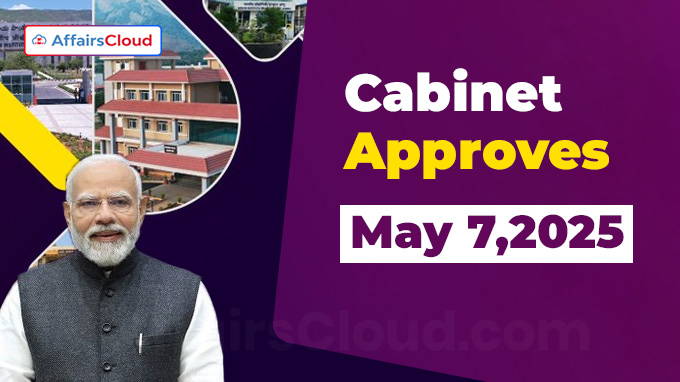 The Union Cabinet chaired by the Prime Minister(PM) Narendra Modi has approved the following proposals/schemes:
The Union Cabinet chaired by the Prime Minister(PM) Narendra Modi has approved the following proposals/schemes:
- Approved the National Scheme for Industrial Training Institute (ITI) Upgradation and the Setting up of five (5) National Centres of Excellence (NCoE) for Skilling.
- Approved the expansion of academic and infrastructure capacity of five Indian Institutes of Technology (IITs).
- Approved the revised SHAKTI (Scheme for Harnessing and Allocating Koyala Transparently in India) Policy for Coal Allocation to Power Sector.
Cabinet Approves National Scheme for ITI upgradation:
The Union Cabinet has approved the National Scheme for Industrial Training Institute (ITI) Upgradation and the Setting up of five (5) NCoE for Skilling. The aim of the scheme to equip over 2 million youth with industry-relevant skills over the next five years.
- The National Scheme for ITI Upgradation is implemented by the Ministry of Skill Development and Entrepreneurship (MSDE). Within the MSDE, the Directorate General of Training (DGT) is responsible for overseeing the execution of this scheme.
About National Scheme for ITI upgradation:
i.As per the announcement made in budget 2024-25 and 2025-26, this scheme will be implemented as a Centrally Sponsored Scheme (CSS) with outlay of Rs. 60,000 crore .
ii.This includes central share of Rs. 30,000 crore, state share of Rs. 20,000 crore and industry share of Rs. 10,000 crore with co-financing to the extent of 50% of central share by the Asian Development (ADB) and World Bank (WB).
iii.The scheme will upgrade 1,000 Government ITIs via hub and spoke arrangement, using an industry-led Special Purpose Vehicle (SPV) model for an outcome-driven implementation strategy.
iv.Under the scheme, infrastructure upgradation for improved Training of Trainers (ToT) facilities will be undertaken in five National Skill Training Institutes (NSTIs), namely Bhubaneswar(Odisha), Chennai(Tamil Nadu, TN), Hyderabad(Telangana), Kanpur, Uttar Pradesh(UP) and Ludhiana(Punjab)
v.It will create a pipeline of skilled workers aligned with industry demand, thereby addressing skill shortages in high-growth sectors such as electronics, automotive, and Renewable Energy(RE).
Note: The inaugural National Skill Training Institute (NSTI) was established in 1963. As of 2025, India has expanded this network to include 33 NSTIs.
Cabinet approves expansion of 5 IITs:
The Union Cabinet has also approved the expansion of academic and infrastructure capacity of five new IITs in the States/Union Territory (UT) of Andhra Pradesh, AP (IIT Tirupati), Kerala (IIT Palakkad), Chhattisgarh (IIT Bhilai), Jammu & Kashmir(J&K) (IIT Jammu) and Karnataka (IIT Dharwad).
- The infrastructure expansion is in line with the national effort to double the IIT student capacity from 65,000 to 1.35 lakh over the past decade, as outlined in the 2025-26 Union Budget.
Key points:
ii.The Cabinet has approved Phase-B of the construction plan for these IITs, with an estimated investment of Rs.11,828.7 crore over the four-year period from 2025 to 2029.
iii.It has also approved the creation of 130 faculty posts and 5 new state-of-art research parks.
iv.On completion of construction, these five IITs shall be able to cater 13,687 students as against current student strength of 7,111 i.e. an increase of 6,576 students.
Cabinet Approves revised SHAKTI Scheme:
The Cabinet Committee on Economic Affairs (CCEA) chaired by the PM Narendra Modi, approved the Revised SHAKTI (Scheme for Harnessing and Allocating Koyala Transparently in India) Policy to streamline coal allocation to the power sector, enhancing transparency and flexibility to meet both long-term and short-term coal requirements.
- SHAKTI policy was introduced in 2017 to implement a more transparent way of allocation of coal linkages through an auction / tariff-based bidding.
Key Features of the Revised SHAKTI Policy:
The revised SHAKTI Policy, besides supporting Brownfield expansion, will promote setting up of Greenfield Thermal Power Projects primarily at pithead sites i.e. nearer to the coal source.
- Under the revised SHAKTI policy, fresh coal linkages have been sanctioned for thermal power plants (TPPs) across the central and state sectors, as well as for independent power producers (IPPs).
- The existing SHAKTI policy has 8 paras for coal allocation, which have now been mapped to the following two windows:
Window-I (coal at notified price):
i.Existing mechanism for grant of coal linkage to Central Sector Thermal Power Projects (TPPs) including Joint Ventures (JVs) and their subsidiary to continue.
ii.Coal linkages to be allocated to States and to an agency authorized by group of States as per existing mechanism, on the recommendation of Ministry of Power.
iii.Coal linkage earmarked to States may be utilized in their own plants or give it to Independent Power Producers (IPPs), who are identified through Tariff Based Competitive Bidding (TBCB) or existing IPPs having Power Purchase Agreement (PPA) under Section 62 of the Electricity Act, 2003.
Note: Coal linkage is like a long-term contract that ensures steady and assured coal supply to industries or power plants.
Window-II (premium over notified price):
i.Any domestic coal-based power producer (having PPA or not having PPA) and also Imported coal-based power plants can secure coal on auction basis for a period upto 12 months or for the period of more than 12 months upto 25 years by paying premium above the notified price and providing the power plants the flexibility to sell the electricity as per their choice.
iii.Directions would be issued to Coal India Limited (CIL)/ Singareni Collieries Company Limited (SCCL) for implementation of the aforesaid decisions.
Recent Related News:
On April 05,2025, President Droupadi Murmu gave her assent to the Waqf (Amendment) Act, 2025. The Bill was passed by Parliament after three days of intense debate in both the Lok Sabha and the Rajya Sabha.
- The objective of the Waqf (Amendment) Act,2025, is to amend the Waqf Act, 1995, to redress the issues and challenges in regulating and managing Waqf properties.




